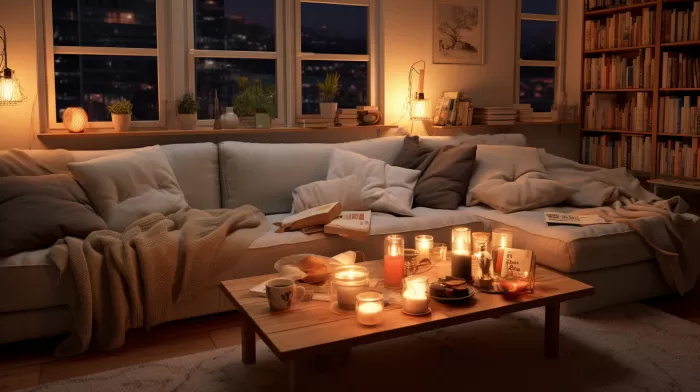Are you guilty of nighttime snacking? We’ve all been there: watching late-night TV and craving something to munch on. But those late-night cravings could be wreaking havoc on your waistline. The solution? It may be as simple as changing the lighting in your home. A study by Northwestern University in Chicago has found that the color temperature of your lighting can actually increase your hunger at night and change your metabolism for the worse.
So, what’s the trick? In short, adopting warmer lighting (with less blue light) could help you avoid late-night binge eating, stay slimmer, and improve your overall well-being. Read on to learn more about the study’s key findings and other tips for keeping those cravings under control.
##The Impact of Blue Light on Hunger and Metabolism
The Northwestern University study has shown that just a single three-hour exposure to blue-enriched light in the evening can significantly impact hunger and glucose metabolism. According to researcher Ivy Cheung, the findings are important because they suggest that “manipulating environmental light exposure for humans may represent a novel approach of influencing food intake patterns and metabolism.”
The research revealed that blue light exposure was associated with increased hunger, starting 15 minutes after experiencing the bluish light, and lasting for almost two hours after dinner time. Additionally, blue lights were found to reduce sleepiness and increase insulin resistance.
##Why Does Blue Light Affect Our Appetite?
Blue light can impact our bodies in multiple ways. It regulates the production of melatonin, a hormone responsible for regulating sleep-wake cycles and is essential for a good night’s sleep. Excessive exposure to blue light at night can suppress melatonin production, resulting in disrupted sleep patterns and increased nighttime hunger.
Another factor to consider is blue light’s effect on glucose metabolism. The Northwestern University study found that blue light can negatively impact glucose metabolism, leading to increased insulin resistance. Insulin resistance can cause weight gain by making it harder for your body to use insulin effectively to convert glucose into energy, resulting in more glucose being stored as fat.
So, by decreasing your exposure to blue light in the evening, you could potentially improve your sleep, regulate your hunger, and maintain better glucose metabolism.
##How to Minimize Blue Light Exposure at Home
- Dim the Lights: The easiest way to reduce exposure to the blue-tinged light is to dim your lights in the evening, which will create a more relaxing atmosphere for dinner and unwinding before bed.
-
Choose Warmer Light Bulbs: Opt for light bulbs with a warmer color temperature (usually labeled as ‘soft’ or ‘warm’ white), which emit a light that is less blue than traditional bulbs. This will help create a calming environment that can help suppress hunger and promote better sleep.
-
Limit Screen Time: Devices like smartphones, tablets, and computer screens all emit blue light. Try to limit the use of these devices before sleep, and consider using applications or device settings that reduce the blue light emission when possible.
-
Embrace Natural Light: During the day, try to get as much natural light as possible. This will help regulate your circadian rhythm and potentially reduce your desire for late-night snacking.
-
Try Light Therapy: Light therapy, also known as phototherapy, can involve the use of light boxes that simulate natural outdoor light. Using a light box in the morning might help you reset your internal clock and thereby prevent evening cravings.
##Additional Tips for Curbing Late-Night Snacking
Besides adjusting your home lighting, there are other ways to control nighttime cravings. Here are a few additional tips to help you manage those late-night urges:
- Stay hydrated: Thirst can often be mistaken for hunger. Make sure to drink plenty of water throughout the day.
- Stick to a meal schedule: Eating at consistent times can help regulate your body’s hunger signals. Try to have dinner and other meals at set times each day.
- Choose nutrient-dense, high-fiber foods: Consuming more whole, unprocessed foods that are rich in fiber and other essential nutrients can help keep you feeling full and satisfied for longer periods of time.
- Avoid mindless eating: Distracted eating while watching TV or working can lead to overeating. Practice mindful eating by taking your time and savoring each bite.
- Find alternative nighttime activities: If snacking at night has become a habit, try replacing it with a healthier activity, such as reading, taking a bath, or engaging in relaxation exercises.
In conclusion, simply by adjusting the lighting in your home and implementing some healthy habits, you can prevent late-night cravings, improve your sleep, and support better weight management. Give it a try and see the difference it can make in your overall well-being.



